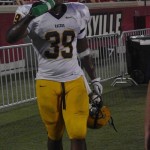Though the weather has been cooler the last few days, the summer scorch has been making an early preview at Murray State this spring, and it’s changing the dynamic of practices and games for outdoor sports.

With temperatures reaching the upper 80s, athletes are using more methods to beat the heat.
“The temperature has affected us positively because it prepares us to play in the heat,” soccer Head Coach Beth Acreman said. “But negatively because it’s tougher to practice outside in this condition.”
Since the rise in temperature, referees allow soccer players to drink in between each half. Players also take heat pills to maintain minerals normally lost in sweat.
According to the U.S. Medical Research and Nutrition Laboratory, water isn’t the only vital material excreted in sweat. When sweating, calcium, iron, potassium, sodium and zinc are also lost from the body. Similar to heat pills, sports drinks like Gatorade and Powerade contain the same minerals meant to replenish athletes in strenuous situations.
“It’s a salt-based supplement to maintain nutrients,” Acreman said. “It’s not considered a drug but it does help with keeping them hydrated and maintaining energy.”
Kentucky weather has a tendency to shift unpredictably from hot to cool, to which junior defender Janelle Cunningham said is difficult to adjust.
“It’s so hard because the weather here is so bipolar,” Cunningham said. “It’s hard to run in the heat and we have to take many more water breaks. I’m used to playing in tropical areas and it is still a transition for me.”
Though the heat can pose a challenge for a constant-motion sport like soccer, baseball Head Coach Rob McDonald welcomes the temperature change.
“Warm weather always positively affects baseball,” he said. “It makes everyone feel quicker and looser. Baseball is a hard sport to play when you can’t feel your hands.”
Baseball games require less running, making it easier for players to retain nutrients and sweat less, however, any sport played outdoors runs the risk of players experiencing heat exhaustion and heat stroke.
Heat stroke occurs when the body overwhelms itself when trying to cool off. According to the Mayo Clinic, symptoms include nausea, dizziness and vomiting and can be prevented with fluid intake periodically. Athletes should take water breaks when playing in the heat even if they don’t feel thirsty.
McDonald said the team takes more water breaks as an extra precaution when temperatures reach upper 90 to 100 degrees.
Though the heat poses a challenge, Racer athletes take steps to maintain fitness during the summer heat.